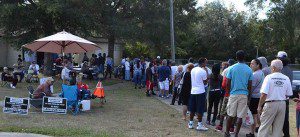
A “perfect storm” of elections problems created the long lines and other issues that irritated Floridians in November, elections supervisors told lawmakers Monday, even as divisions over how to fix those problems began to crop up.
Supervisors and lawmakers agreed that several factors converged in the November voting, from the length of the ballot to the number of early-voting days and the availability of early-voting sites, leading to Florida being the last state called in the presidential election. The state was eventually carried by President Barack Obama, but that result wasn’t known until days after he was projected to have won a second term.
“It was a combination of things that have contributed to our perfect storm election,” said Lee County Supervisor Sharon Harrington.
But Senate Ethics and Elections Chairman Jack Latvala, R-St. Petersburg, pushed back on the notion that Florida was once again the problem child in presidential elections. Instead, the closeness of the state and the importance of its 29 electoral votes more often shine the national spotlight on Florida.
“These same issues, if they happened in others states, might not have the same focus that we have,” he said.
Seminole County Supervisor Mike Ertel went further.
“We had a good election statewide in Florida; we have to remember this,” Ertel said. As to late-night jokes at the expense of the state, he said: “I don’t care what Jay Leno thinks. I care what Florida voters think.”
The hearing focused on two of the issues that have taken up most of the attention in the wake of the election: Early voting and a number of proposed constitutional amendments blamed for stretching many counties’ ballots onto multiple pages.
Latvala told reporters after the meeting that he planned for the committee to begin work on an elections bill in February. In addition to the issues highlighted by the elections snafus, Latvala said the bill would address gaps in absentee ballot security pointed out by a grand jury report on absentee ballots in Miami-Dade County.
Most supervisors said the state should at least give them discretion to have more days of early voting, after a 2011 change in the law slashed the number of days before the elections that voters could cast ballots from at least 12 to no more than eight.
But lawmakers questioned whether supervisors had opened up enough early-voting sites to handle the crush of voters who tried to cast ballots on those early days. Miami-Dade County Supervisor Penelope Townsley, who conducted a thorough after-action report on the election in her county, admitted she had not.
“If we had to do that again, we would definitely increase the number of early voting sites that were used,” Townsley said.
Other supervisors said they needed more flexibility on where to place early voting sites, and said that not every eligible early voting site was a practical place to have voters to cast ballots because of concerns that range from parking to electrical capacity.
“To invite them to a facility that can accommodate them very efficiently is, I think, a better thing than to just have a lot of sites that are non-productive,” said St. Lucie County Supervisor Gertrude Walker.
Supervisors also pointed to the referendums placed on the ballot by the Legislature, and the exemption in state law that allows lawmakers to avoid the 75-word limit on amendment summaries that applies to citizen initiatives.
“If we can elect the president of the United States based solely on his or her first and last name, I believe that we can pass an amendment with 75 words,” Ertel said.
Even some lawmakers who voted for the exemption in 2000 — after the Supreme Court threw out a legislatively-proposed death-penalty amendment because of its summary — said they were ready to reverse course.
“I have to admit I was maybe part of the problem … about the language that appears on the ballot,” said Sen. John Thrasher, a St. Augustine Republican who was in the House at the time.
Latvala said he was less certain that was at the root of the problem, pointing out that the law has been effect for a decade now.
“I don’t think it’s the fault of the Legislature 100 percent that we had these lines,” he said.
by Brandon Larrabee


